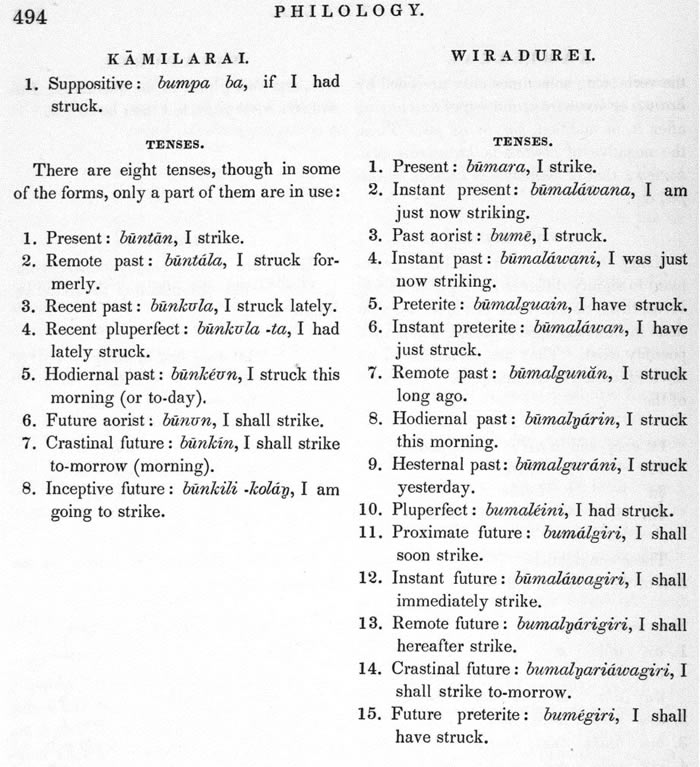March 08, 2007
Journalistic dreamtime
Bill Decker drew my attention to the third of Rolf Potts' dispatches in Slate about outback tourism in Australia ("A Visit to the Artistic Hillbillies of Utopia", 3/7/2007), which includes a lovely specimen of the "No Word for X" snowclone:
For 40,000 years, the accumulation of possessions was considered an impediment to a lifestyle that required constant mobility within a harsh climate. Surplus food was used or destroyed, and refusal to share resources with the community (a cautionary motif in many aboriginal dreamtime stories) could result in violent punishment. Life was lived in the mythic moment; aboriginal languages had no words for "yesterday" or "tomorrow." [emphasis added]
Bill explained that "As a LL reader, I have become sensitized to certain phrases, especially those used in such an offhand manner". And his bullshit detector is well tuned: the sentence in boldface might be true in journalistic dreamtime, but it's bunk as real-world fact.
I asked Claire Bowern, and she responded:
Plenty of Australian languages have separate adverbs for yesterday and tomorrow (e.g. Bardi ngoorriji "tomorrow" and bardi "yesterday"; Yan-nhangu gordarr' "tomorrow" and gathara "yesterday".
In some languages "yesterday" and "tomorrow" are the same word (I think some South Indian languages have this too - I've heard of it elsewhere). Most languages in Australia have a tense/aspect system that distinguishes past from present from future (although not all do).
Elsewhere in his article, Potts mentions two languages spoken in the area he's writing about, which is called "Utopia":
Nearly the size of Luxembourg, this area includes more than a dozen remote communities, where the primary languages are Anmatyerr and Alyawarr, dialects vaguely similar to the Arrernte spoken in the Alice Springs area.
David Nash observed that
... a casual look at a Learners Guide for these languages shows the usual tense-marking by verb suffix, and lexical items for 'yesterday' and 'tomorrow'.
David adds
And writing as I am from Wiradjuri country, I can't let the opportunity pass to mention the exuberant slicing of time reference (etc) in the verb here, as recently mentioned in Peter Austin's paper 'The Aboriginal languages of south-eastern Australia' last year at the 2006 Kobe-Oxford conference on "The Linguistics of Endangered Languages". From Peter's draft, which I quote without his permission:
Contrasts found widely and only in south eastern Australian languages include encoding the time of day of an event as a suffix placed between the verb root and the tense inflection. Note: Hale (1846:494) who notes 'hodiernal past', 'hesternal past' and 'crastinal future' in Awabakal (which he confusingly calls "Kamilarai") and Wiradjuri.
That's Horatio Hale, "Ethnology and Philology", pp. 479-531 in Narrative of the U.S. Exploring Expedition, Volume 1 by Charles Wilkes. Philadelphia: C. Sherman, 1846. And on p. 494, Hale gives examples of the 8 "tenses" of Kamilarai and the 15 "tenses" of Wiradjuri. Linguists today would call these combinations of tense and aspect, I suspect, perhaps with incorporation of certain time-adverbials as well -- but under any description, they indicate a conceptual life with a clear sense of the passage of time and its division by the motions of the sun:

David started his note to me with an interesting observation about Potts' article and the journalistic process in general:
Well, I am grateful for being pointed to the three Potts pieces; I don't think I had heard of him.
Some clangers, and some fresh observations in there too (notably "I realize that his very strength as a tour guide is that he doesn't really give a crap about tourists.").
The irritating bits are mostly the genuine hearsay -- a presumably accurate report of tendentious stuff some guide told him repeated as accurate.
David pointed out that there's another major clanger among Potts' linguistic assertions (this one is from Potts' second dispatch, "If It's Tuesday, This Must Be Arrernte Country", 2/6/2007):
Before the arrival of European interlopers, indigenous Australian societies spoke around 250 languages and 700 dialects. Though all these aboriginal subcultures shared a land-based nomadic lifestyle, similar religious practices, and some forms of intertribal trade, they never developed a collective sense of "aboriginal" identity, and broad cultural variations existed across relatively short distances. British settlers in the late 18th century, for example, noted that Aborigines on the north side of Sydney Harbor spoke a different language from those living on the south side. To this day, most indigenous Australians identify more with their historical kinship group than a general "aboriginal" identity, and the closest thing to a cultural lingua franca is English (which is usually pidginized, since its vocabulary isn't well suited to expressing the nature-based indigenous worldview). [emphasis added]
The ideas implicit in the bold-faced phrase deserve a separate post. For the moment, let's just say that this is a novel and original theory of the origins of pidgins. No, actually, let's say that it's complete nonsense, yet another indication of how badly my profession has failed in preparing today's intellectual classes to think coherently about anything having to do with language and communication.
Among the dozens of Language Log posts on the "no word for X" fallacy, there are a few on the specific "no notion of time", "life in the mythic moment" variant:
"'60 Minutes' doomed to repeat itself" (12/24/2005)
"No word for 'lazy hack parroting drivel'?" (4/1/2005)
"No concept of the future, no yuccas either" (5/11/2006)